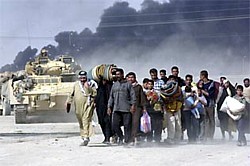Perspective: Iraqis flee war, run into hostility
 CAIRO — Strolling the alleys and boulevards of this city, Raaid Lafta sometimes thinks he glimpses his old country: in the barber's face, in the baker's oven, in the way the restaurant chef serves the spiced dishes he's known since boyhood.
CAIRO — Strolling the alleys and boulevards of this city, Raaid Lafta sometimes thinks he glimpses his old country: in the barber's face, in the baker's oven, in the way the restaurant chef serves the spiced dishes he's known since boyhood.Like him, the barber, baker and chef are Iraqis adrift in war. Escaping their battered homeland in crowded cars and lopsided buses, boarding planes and walking stretches of desert, Iraqi refugees are a growing diaspora in Cairo, Damascus, Amman and other Arab cities. With children in tow and life savings hidden in pots and suitcases, they are another precarious burden for the Middle East.
"I see everyone speaking in an Iraq accent," Lafta said. "Iraqi men singing Iraqi songs in the streets, Iraqi cafes, Iraqi shops…. I was opening a bank account here, so when the banker asked for my address, I replied that I live in Cairo's 6th of October neighborhood. He smiled and said, 'You Iraqis have invaded October.' "
An estimated 100,000 Iraqis leave their country each month, including many of Iraq's best educated professionals, part of the more than 1.6 million who have fled since the 2003 U.S.-led invasion.
Read the rest at the LA Times

<< Home